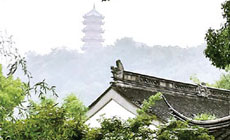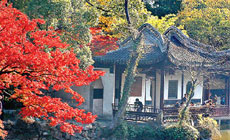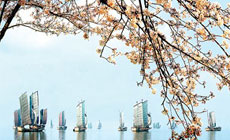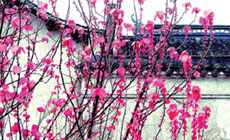Editor's note: Many Chinese cities have been showing distinctive features in seeking their ways of enhancing their economies' growth amid the nation's unprecedented, and the world's largest ever, urbanization process.?The following?is a collection of our reports about Wuxi, Jiangsu province, and its efforts in sustainable development after it has become one of the most affluent cities on the Chinese mainland. [Read more]
China's Grand Canal has a history of 1,400 years and a total length of 2,700 kilometers. But Wuxi claims to be the only city that part of the canal cuts through. Many residents like to own a modern residence overlooking the ancient canal.
|
Canal city rise
Anyone wanting to find one city that is representative of China's economic transition need look no further than Wuxi - a city of 6.5 million residents in the Yangtze River Delta. [More]
|
City's fortunes flow in tandem with river
Throughout history, many cities have prospered because of their proximity to rivers. One such settlement is Wuxi, where the main river has greatly benefited the city's standing. [More] |
?
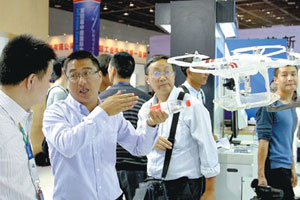 |
|
Scientists and engineers at an expo of the Internet of Things recently held in Wuxi. |
In the No 3 People's Hospital of Wuxi, all patients wear a plastic bracelet printed with a unique bar code that references critical information.
With a simple scan of a patient's code with a hand-held device, nurses can get access to a wide range of information, from the medicines that have been administered to the patient's account balance. [More]
|
?
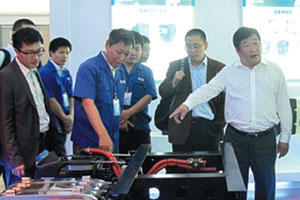 |
| Kailong High Technology Company's product exhibition in Wuxi. |
Business sensitivity, market foresight and a sense of crisis in the blood of Wuxi businessmen have made the pursuit of innovation a central task for them throughout history, said a local expert, and the slowdown of the Chinese economy requires them to re-awaken those traditional business genes as rapidly as possible. [More] |
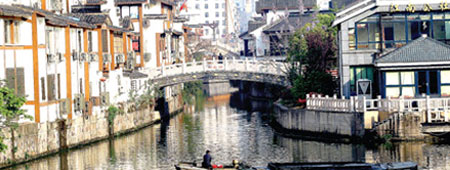
Residences overlooking small bridges and clear rivers - a typical scene of a Yangtze Delta town. |
Commerce, education blend well in culture
In recent years, there's been a quiet revival of interest in the Yangtze River Delta that covers cities like Wuxi, Shanghai and Suzhou.
It is a Chinese subculture named after the Wu kingdom in this area of the Spring and Autumn period (770-476BC). It is the old tradition that has shaped the local people's industrious and flexible traits. [More] |
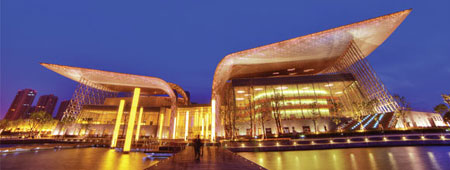
Wuxi's newly-built opera house. |
Buying university ideas and solutions becoming a trend
Having exhausted its cheap labor and resources, which boosted the city's double-digit growth for nearly 30 years, Wuxi faced pressing needs of innovating its industrial technologies.
Wuxi has turned to "foreign brains". The government vowed to invite at least 30 leading engineers to help its industries by 2012, and meted out one of the most generous assistance programs in China to help innovative people industrialize their ideas after 2008. [More] |
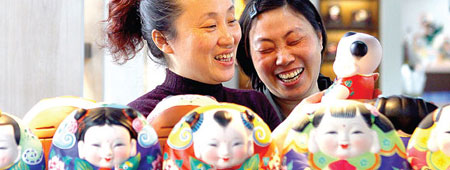
Wuxi clay figurines are popular with tourists. |
$16m grants help to create arts hub
Wuxi's dramatic transformation is not limited to the economy but extends to many areas.
As its population becomes increasing sophisticated, local officials are seeking to offer more than just opportunities to start businesses. Also on offer is a life of cultural richness. [More] |

?
|
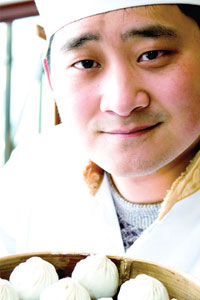
|
| Wuxi cuisine features a variety of dumplings. |
Century-old restaurant offers many specialties under one roof
During China's most important holiday, Spring Festival, many residents of Wuxi used to visit Chong'an Temple and have a bowl of wonton at Wangxingji, a time-honored restaurant.
Though customs change as time goes by, the restaurant is still one of the locals' favorite places when they want to taste specialties. [More] |
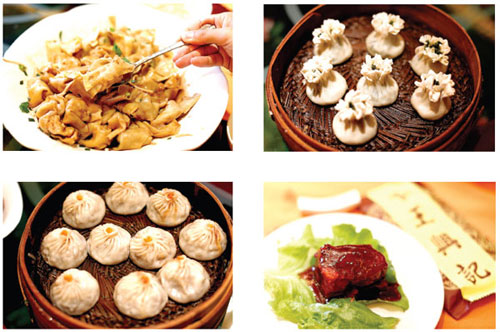 Some of the delicacies offered by the Wangxingji restaurant. |
|
Ecology: From factory town to garden city |
|
Hills and lakes, once victims to pollution, turning green and clean
The tea gardens here are where the retirees gather and single local opera tunes.
The lavender farms are where middle-class young couples, with women in white wedding gowns, pose for French-flavored wedding shots...
The city government of Wuxi began refilling the stone pits in Junzhang Hill in 2005, initiating Wuxi's largest ecological restoration program. The once-wounded hillsides are now repaired and are covered by lush plants.?[More] |
| ?
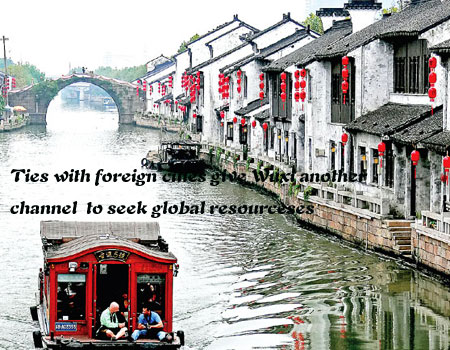
|
Sister-city pacts bring about a variety of opportunities
Wuxi is building a global sorority of cities.
The economic hub in Jiangsu province has forged 46 sister city relationships in 27 countries on five continents. And it aims not only to develop existing alliances but also to establish new ones.
Wuxi's sister city relationship with San Antonio, Texas, won the 2014 Most Innovative Award by Sister Cities International. The affiliation was established in 2012.
"Two years isn't very long," said Chen Minghui, director of Wuxi's foreign affairs office and president of its association for friendship with foreign countries. [More]
|
?
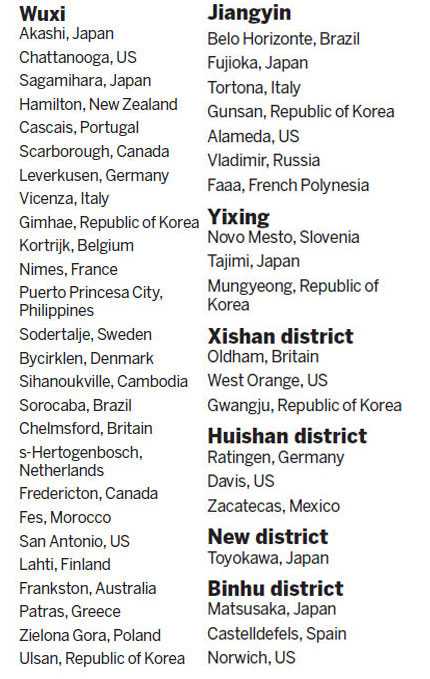
|
| Leader evaluates Wuxi's past, present and future |
Turning competence into competitiveness |
City not complacent after having built strong industry, achieved China's highest per capita GDP
Wuxi city is a pioneer among Chinese cities transitioning to more quality-oriented economic growth and enhanced citizens' happiness.
The city's top leader, Huang Lixin, recently briefed China Daily about what her city has achieved and plans to accomplish in the next few years.
|
Wuxi New District has a strategy to attract foreign investment when preferential policies expire
The Wuxi New District is the city's high-tech industrial base.
It was started in 1992 and in 2013 its GDP was more than 120 billion yuan ($19.3 billion).
Its success story, said Xu Gang, WND's top boss, cannot be separated from its effort to win over the world's largest multinational corporations, which now contributes 80 percent of WND's output.
|





